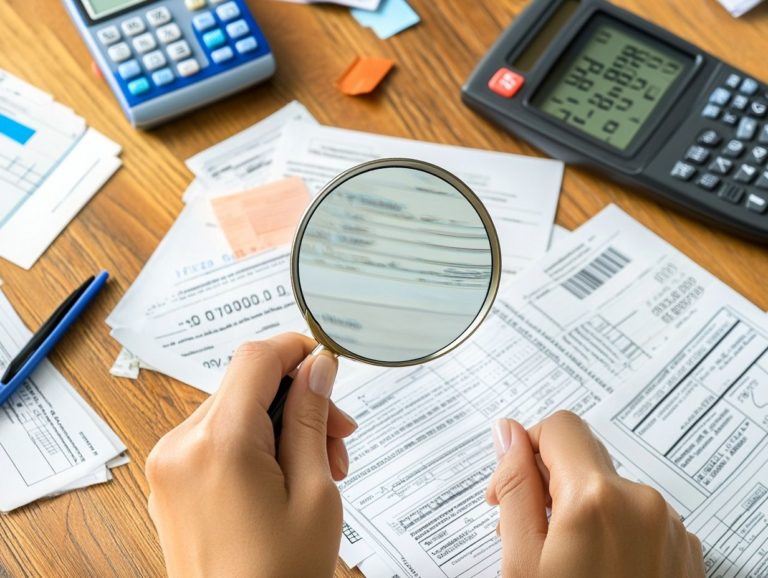The Best Time to Apply for a Credit Card
Credit cards can serve as powerful financial tools, but understanding when and how to apply is essential for unlocking their full potential.
This guide includes the fundamentals of credit cards, their purpose, and the vital elements dictating when to submit an application.
You ll discover why timing holds such significance and what factors to weigh before taking the plunge. You ll also learn the most effective strategies to bolster your chances of approval.
Whether you re venturing into the world of credit for the first time or aiming to enhance your existing credit profile, this comprehensive resource is designed to meet your needs.
Contents
- Key Takeaways:
- Understanding Credit Cards
- The Importance of Timing in Credit Card Applications
- Factors to Consider Before Applying for a Credit Card
- Best Time to Apply for a Credit Card
- Maximize Your Approval Chances
- Frequently Asked Questions
- When is the best time to apply for a credit card?
- Can I apply for a credit card if I have a low credit score?
- Is there a specific time of year that is best to apply for a credit card?
- Should I apply for multiple credit cards at once to increase my chances of approval?
- What are the benefits of applying for a credit card during a promotional period?
- Can I apply for a credit card if I have no credit history?
Key Takeaways:

- The best time to apply for a credit card is when you have a good credit score and a stable financial situation.
- Timing matters because it impacts your chances of approval and the terms you receive.
- Consider factors like your credit score and current financial situation before applying for a credit card.
Understanding Credit Cards
Grasping the intricacies of credit cards is vital for making sound personal financial choices. These choices can profoundly influence your credit profile and future financial prospects.
Credit cards come with various features, including balance transfers and enticing rewards points that help you manage expenses or facilitate significant purchases.
However, it s essential to stay vigilant about high interest charges and their impact on your overall credit score. This guide will empower you to explore the benefits and responsibilities that accompany being a cardholder.
What are Credit Cards?
Credit cards serve as powerful financial tools that allow you to borrow funds up to a specified limit. This enables you to make purchases or manage your cash flow with ease.
These versatile instruments grant immediate access to funds and present a plethora of benefits that can elevate your financial decision-making. Many credit cards offer cash back rewards, allowing you to earn while you spend.
It s crucial to grasp the concept of credit limits. Exceeding these limits can negatively impact your credit score and result in additional fees. Each application for a credit card triggers a hard inquiry, a check that lenders perform to see your credit history, which temporarily affects your score.
The Importance of Timing in Credit Card Applications
The timing of your credit card application can greatly impact your chances of approval. Choose the optimal moment based on your financial circumstances.
Consider factors like existing hard inquiries on your credit report and your current credit score. Whether you have received a pre-approved offer also plays a role in your ability to secure a new credit card.
Understanding these elements empowers you to make informed financial decisions that align perfectly with your goals.
Why Timing Matters
Timing is crucial when applying for a credit card. It can significantly influence your credit score and shape your financial future.
Understanding the best time to submit your application is essential. Consider your current credit status and recent hard inquiries.
If your credit score isn t where you want it to be, waiting for it to improve can work in your favor. A higher score often translates to better terms and lower interest rates.
Be mindful that multiple hard inquiries within a short timeframe can lower your score further. Regularly monitoring your credit report helps you uncover discrepancies and identify areas needing attention.
Ready to discover the best time to apply for a credit card? Start monitoring your credit score today to prepare for your application!
Factors to Consider Before Applying for a Credit Card

Before you apply for a credit card, it’s crucial to act wisely and weigh several key factors. Your credit score, credit history, and current financial situation can significantly influence your chances of approval and the type of card you can secure.
Understanding your credit mix (the variety of credit accounts you have) and existing balances is essential. This plays a crucial role in your decision-making process, especially if you’re considering other financial products like a mortgage.
By taking a proactive approach, you can pave the way for better financial outcomes. This helps you work towards achieving your financial goals with confidence.
Credit Score and Credit History
Your credit score and credit history are pivotal in the credit card approval process; they reflect your reliability and responsibility as a borrower.
These elements are assessed based on your payment history, credit utilization (how much of your available credit you are using), length of credit history, types of credit used, and recent credit inquiries.
FICO scores are a widely accepted standard that highlight these factors, providing lenders with a concise overview of your credit health. Maintaining a solid credit history not only enhances your chances of credit card approval but also opens the door to better interest rates and terms.
Effectively managing your credit accounts sends a powerful message to potential lenders. This influences your future borrowing possibilities and overall financial flexibility.
Current Financial Situation
Your current financial situation, including existing balances and monthly payments, is key in deciding whether to apply for a new credit card.
Understanding your income, expenses, and any outstanding debt greatly impacts your decision-making process. This assessment reveals if you can handle another line of credit.
It also guides you toward the credit card options most beneficial for you. For instance, some cards provide cash back on purchases, leading to significant savings if used wisely.
By examining your financial habits and recognizing patterns, you can choose a credit card that aligns with your lifestyle while effectively managing your financial responsibilities.
Best Time to Apply for a Credit Card
Understanding the optimal timing for applying for a credit card can significantly boost your chances of approval. It also helps maximize the advantages of limited-time offers or enticing introductory APRs.
General Guidelines
To determine the optimal time for your credit card application, align your timing with your financial goals and the availability of promotional offers, such as enticing introductory APRs.
Understanding when these promotions typically roll out can enhance the benefits you reap from a new credit account. Many credit card issuers launch special campaigns during holidays or seasonal events, making these moments perfect for uncovering lucrative deals.
Evaluating your personal financial readiness is crucial. Take a moment to assess your current debt levels, monthly budget, and any upcoming expenses.
By timing your application strategically, you can maximize rewards while ensuring that the new credit line positively impacts your financial landscape.
Specific Situations

Specific situations, such as managing your current credit or recovering from a rough patch, can significantly influence the ideal moment to apply for a new credit card.
If you’re looking to consolidate debt, timing becomes paramount. Applying for a new card when interest rates are low can offer relief to manage burdensome loans effectively.
With good credit, you might find yourself in an advantageous position to seize welcome bonuses from various credit card issuers. These bonuses often come in the form of cash back or points, enhancing your travel experiences.
Stay mindful of how a new application could impact your existing credit score. While a new application might temporarily lower your score, managing it wisely can lead to substantial long-term benefits.
Maximize Your Approval Chances
Enhancing your chances of credit card approval requires a strategic mindset. Begin by gaining a clear understanding of your credit score, as this key part plays a significant role in the approval process.
Minimize hard inquiries that can negatively impact your score, and don t overlook the value of pre-approved offers, which can significantly increase your likelihood of success.
Steps to Take Before Applying
Before applying for a credit card, it s wise to take some strategic steps to position yourself for success. Start by checking your credit report and gaining a thorough understanding of your existing credit. This preparation can significantly enhance your chances of approval and may even unlock more favorable terms.
Evaluate your financial health; take a close look at your income, expenses, and current debts to understand your financial situation. Then, carefully review your credit report for inaccuracies correcting these errors is vital, as they can negatively impact your score.
Ensure you make timely payments on your existing credit accounts, work on reducing overall debt, and maintain a low credit utilization ratio to further improve your credit score.
By taking these proactive measures, you ll find yourself in a powerful position as you embark on your credit journey!
Common Mistakes to Avoid
Avoiding common mistakes when applying for a credit card can significantly boost your chances of approval while helping you uphold your credit responsibilities.
Many individuals overlook the importance of researching their options, leading to unnecessary hard inquiries on their credit reports that can temporarily lower their scores. It s essential to read the fine print associated with credit card applications, as misinterpreting fees or interest rates can lead to financial burdens later on.
Often, applicants rush to apply for multiple cards in quick succession, mistakenly believing this will enhance their benefits. However, this approach can raise red flags for lenders instead. Taking the time to understand your credit responsibilities will empower you to make informed decisions that benefit your financial future.
Frequently Asked Questions
When is the best time to apply for a credit card?

The best time to apply for a credit card is when you have a good credit score, stable income, and a clear understanding of your spending habits. This will increase your chances of getting approved and help you avoid any potential financial struggles.
Can I apply for a credit card if I have a low credit score?
It is not recommended to apply for a credit card if you have a low credit score. Your application may be denied, and even if it’s approved, you might face high interest rates. Act now to boost your score before applying!
Is there a specific time of year that is best to apply for a credit card?
There isn’t a specific time of year that is considered the best to apply for a credit card. However, it’s important to be aware of any promotional offers or sign-up bonuses that credit card companies may offer during certain seasons or holidays.
Should I apply for multiple credit cards at once to increase my chances of approval?
No, it’s not recommended to apply for multiple credit cards at once. Each credit card application results in a hard inquiry on your credit report, which can lower your credit score. It’s best to research and choose one credit card that fits your needs and apply for it.
What are the benefits of applying for a credit card during a promotional period?
Take advantage of promotional periods for great sign-up bonuses, cashback rewards, or 0% APR for a certain period. Applying for a credit card during a promotional period can help you save money and maximize the benefits of the credit card.
Can I apply for a credit card if I have no credit history?
Yes, you can still apply for a credit card even if you have no credit history. Look for credit cards that are designed for people with limited or no credit history, such as secured credit cards. Just make sure to use the credit card responsibly to build a positive credit history.






